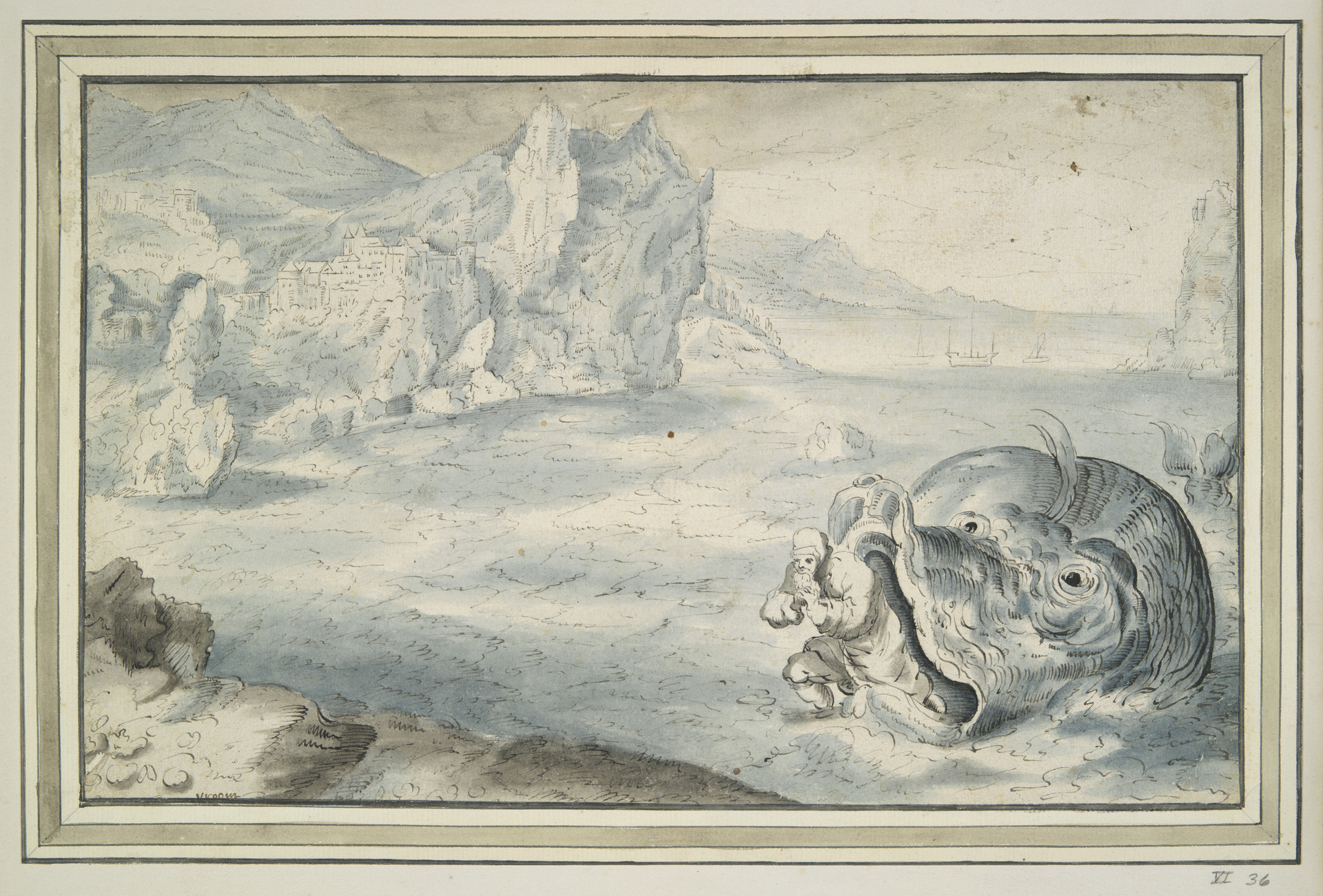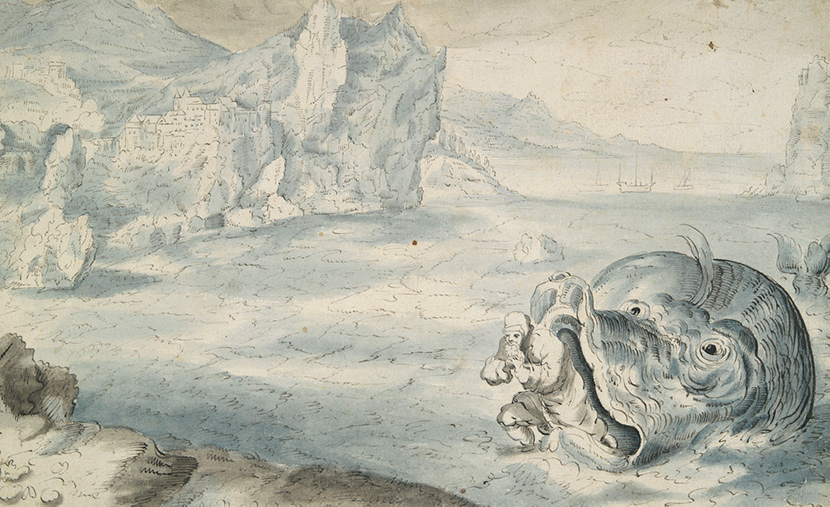According to tradition, the book of Jonah is read in its entirety during the afternoon service of Yom Kippur. Two statements in the Mishnah provide indirect evidence as to why. The first cites the Ninevites who, heed the titular prophet’s warnings to set aside their sinful ways, respond to his message with exemplary fasting and repentance. The second cites Jonah’s supplications in the belly of the fish as an archetype of efficacious prayer. Yet to see this biblical book as a straightforward story modeling prayer, fasting, and repentance betrays the back and forth in this most uniquely troubling and spare of prophetic encounters.
Jonah is not so much about repentance as about the prophet’s protest, or refusal to prophesy, and not about the prophet’s persuading the Lord to have mercy but about the Lord’s having to persuade the prophet that mercy is just. The prophetic temperament is here so nakedly troubled that I’m tempted to call the book an account not of a prophecy but of a therapeutic relationship. The real question is who will heal whom.
Like many tales of prophets, the book begins with the Lord picking a man and giving him a message. But things go off the rails pretty quickly:
And the word of the Lord was upon Jonah son of Amitai, saying: Get up and go to Nineveh, the big town
And cry over it, for their illness has risen before me.
But Jonah got up to run away to Tarsus from before the Lord and went down to Jaffa
And found a boat going to Tarsus, paid his fare, and went below
To go with them to Tarsus away from the Lord.
This is not what prophets usually do. They may refuse the mission, and they may give their reasons and allow the Lord a chance to talk them around—Moses and Jeremiah come to mind—but they do not usually pick up their feet and vamoose out of town. And things get curiouser still:
But the Lord threw a great wind to the sea
And there was a great storm in the sea
And the ship seemed about to break
And the sailors were terrified and cried
Each to his idols and threw the bags in the boat overboard
To lighten their load, but Jonah went down in the hold
Of the ship and lay down and dozed.
Jonah unites in himself two disparate qualities: he refuses absolutely to engage with the Lord, but he acknowledges absolutely the totality of the Lord’s control over the universe. That is, he runs away and won’t speak to the Lord, but he then goes to sleep because he knows there is nothing he can do about the storm the Lord has decided to send. Not so, everyone else in the book.
The others, by the way, are not Jews; nor are they wicked:
Then the captain came upon him and said to him,
“What’s the matter with you, dozing?
Get up and cry to your god. Maybe this god will come around for us and we’ll not perish.”
And they said to one another: “Let’s go cast lots,
And know whom this evil is due to.”
And they cast lots and the lot fell on Jonah.
The casting of lots clarifies to the bystanders in this drama that Jonah is the cause of the mortal danger they are in. Surely something terrible will happen to him now! But it doesn’t:
But they said to him: “Tell us if you please,
Given that it is thanks to you that this evil has come on us,
What’s your profession and where are you from,
What’s your country and your people?”
And he said to them, “I am a Hebrew and the Lord God of the heavens I fear,
Maker of sea and dry land.”
Not only have the sailors refrained from immediately throwing him overboard, but they address him with a politeness you might be surprised to encounter on a passenger jet these days. For Jonah, though, their questions about his background and why he may have incurred this terrible storm are a turning point. Their inquiry elicits his first acknowledgment that he fears the Lord, notwithstanding the fact that every action on his part has indicated otherwise.
The sailors, realizing that Jonah is fleeing the Lord, react to his confession with “a great fear.” But rather than punishing him, they just ask: “What shall we do for you, so the sea stills from over us?” This is a striking reversal of how prophetic careers are supposed to work. The prophet’s job is to heal the rift between man (usually, the Jewish people) and God, yet here these unsophisticated Gentiles are offering to heal the rift between God and prophet.
What does Jonah suggest? “Bear me up and throw me in the sea/ and the sea will be still from over you.” Perhaps he does not think so highly of his fellow human beings, or perhaps he has rueful confidence in the mercy of the Lord. Either way, his shipmates resist his magnanimous if suicidal offer. Instead, they valiantly row with all their might for shore even as the sea keeps getting angrier. Only with great reluctance do they accept the suggestion Jonah made so blithely, but with considerably more fear of the consequences than Jonah himself exhibits.
But they called to the Lord and said,
Pray You, Lord, let us not be lost for the life of this man
And do not hold us liable for innocent blood,
For You are the Lord and as You desired, You did.
And they bore up Jonah and threw him in the sea
And the sea ceased its rage.
But the men feared a terrible fear of the Lord
And sacrificed a sacrifice to the Lord and promised promises.
And the Lord appointed a great fish to swallow Jonah
And Jonah came to be in the bowels of the fish for three days and three nights.
Here we have not one but two miracles in rapid succession. First, a skeptical witness might have dismissed as coincidence the tempest arising in the sea. but the minute Jonah is tossed overboard the sea calms, suggesting to the sailors that their prayer was answered and that Jonah’s explanation was correct. Second, we have the first supernatural intervention in the book, signaled by the word “appointed,” which will recur hereafter whenever the Lord uses a physical entity to send Jonah a message. Giant fish (or whales, as the Western imagination has it) do not just appear next to shipping vessels, and they certainly do not swallow passengers and allow them to survive for three days and nights in their gullets. Incidentally, the symbol of the city of Nineveh in Akkadian was a fish inside a house, so, to get Jonah to comply, the Lord is metaphorically imprisoning him inside a physical representation of Nineveh.
Only now, finally, does Jonah consent to speak to the Lord—after conspicuously refusing to pray while on ship. After describing his woes and his hope for salvation, Jonah concludes:
May my prayer come before You to Your holy temple
And I with thanks, aloud, will make a sacrifice—
What I promised I’ll pay—
Deliverance is the Lord’s.
The prayer is perfunctory. There is no confession of disobedience, no account of why he has refused his mission. In his prayer Jonah is no more morally enlightened than the sailors who promised they’d make sacrifices to pay for their deliverance. Nevertheless, his prayer is accepted.
And the Lord spoke to the fish and it vomited Jonah to dry land.
But the word of the Lord was upon Jonah a second time, saying:
Get up and go to Nineveh the big town and cry over it the cry I myself shall convey to you.
And Jonah got up and went to Nineveh as the Lord said.
It is as if someone’s just hit the rewind button. A similar repetition occurs when, in 1Kings 19, Elijah has his dark encounter with the Lord in a cave. There Elijah complains to God that his mission has failed and his message has gone unheeded; after being sent by the Lord to the wilderness, and having watched the glory of the Lord pass by, he simply repeats the same words. Here we have the reverse. The Lord approaches and Jonah runs away; the Lord forces Jonah to listen to Him, gives him the same instructions He gave at the book’s beginning, and Jonah delivers His message to the Ninevites:
But the men of Nineveh believed in God and declared a fast and put on sackcloth,
Both great and small, and the affair reached the king of Nineveh
And he rose from his throne and removed his stole
And covered himself in sackcloth and sat in ashes.
And he raised a cry and said throughout Nineveh in the king’s name and his government’s
To declare that man and beast, cattle and flock should eat nothing, neither graze nor drink water.
And they covered themselves in sackcloth, man and beast, and cried out to God mightily
And they repented each man of his wicked ways and of the ill-gotten gains in their grasp.
In this book, as the Christian Bible scholar Marian Kelsey notes, the usual actions of a prophet are undertaken by others. Jonah very grudgingly announces that the town will be destroyed in 40 days, and instantly the people around him leap to action. He does not have to tell them to repent, or even to fast and don sackcloth. They do it of their own accord! It even becomes official government policy.
Where is the prophet’s role in all this? We’re just about to find out. And it’s here, in the words of the Ninevites, that we get to the nub of the book, the real reason we read this book on Yom Kippur.
Who knows if God will reconsider and be comforted
And repent of his wrath and we shall not perish?
If this book is about therapy and not prophecy, here we have its diagnostic manifesto. The will to destroy the world is a malady of which even the Lord may be cured. We just have to give Him the opportunity by means of a few days of repentance in order to render Him capable of throwing off His black mood and forgiving. In this one-line message, put into the mouths of repenting Gentiles who have hastily thrown away their sins, we learn the book’s essential message:
And the Lord looked over their deeds, for they repented of their wicked way,
And the Lord was comforted over the evil he’d said he’d do to them
And didn’t do it.
The Lord is cured, as it were. He feels better and is not going to rain sulfur and brimstone on Nineveh. This should be a happy ending. Instead, finally, we get to the bone Jonah has to pick with the Almighty.
But Jonah was ill with a great illness and it irked him and he prayed to the Lord and said:
“Pray you Lord, is this not what I said when I was still on my own soil?
That’s why I preempted and fled to Tarsus, because I always knew You were a merciful God
And compassionately patient and full of kindness
And would be comforted over the wickedness.
But now Lord take my life from me,
Because my death is better than my living.”
But the Lord said: “Does what’s better make you bitter?”
This is where Jonah’s own therapy begins, when he confesses his problem with the prophetic mission. If Moses’ prophetic career after leaving Egypt consisted mostly of talking the Lord down from one towering rage after another and persuading him that the Jews are not that bad, then Jonah is the anti-Moses. The illness of the Ninevites that temporarily irked the Lord is permanently in Jonah’s mind. He is a prophet who wants to persuade the Lord that some people are that bad. So deeply troubled is Jonah that the Lord takes his therapy upon Himself. The Lord tells him the cure will not be easy, but He is going to make Jonah change his mind:
And Jonah left the town and settled east of the city and made himself a shack there
And he sat under it in the shade till he saw what became of the city.
And the Lord appointed a pumpkin and it rose over Jonah to be a shade over his head
And save him from his illness.
Contrast this humble gourd to the giant fish that God “appointed” earlier. There’s a reason everyone knows about Jonah and the whale, and only a few about Jonah and the pumpkin. Yet a little shade over Jonah’s fevered brow is enough to make the point of how much it took to get him to talk, and how little it takes to make him happy.
And Jonah rejoiced over the pumpkin a great rejoicing.
But the Lord appointed a caterpillar as dawn rose the next day
And it blighted the pumpkin and it withered.
And it was as the sun rose
That the Lord appointed a silent sultry breeze
And the sun struck Jonah and he fainted
And begged his soul to die
And said, “My death is better than my living.”
In her private journals, the suicidal poet Sylvia Plath muses about the bitterness of her coffee at a moment of isolation and then cheers up after ordering a second cup with cream and telling herself that she is as entitled to eat and drink in Paris as anybody, however unhappy she may have been. There is something of that in this encounter between the Lord and Jonah. The Lord can make Jonah happy by pouring a little cream into his coffee.
This prophet feels very strongly that the wicked must be made to pay for their sins, but he is absolutely delighted with a little shade from a vegetable. Now the Lord confronts him over his glass-half-empty view of things.
But the Lord said to Jonah: “Are you really so embittered on account of the pumpkin?”
And he said, “It was truly bitter enough to me to die.”
But the Lord said, “You fretted over the pumpkin that you never labored over and never raised,
That came about overnight and overnight was lost,
But I should not fret over Nineveh the big town that holds many more than 120,000 souls
Who do not know their right hand from their left, and so many beasts besides?”
This is the abrupt, truly shocking end of this prophetic work, which on the Day of Atonement, when one is contemplating one’s sins, is more disturbing than consoling. The Lord does not persuade Jonah or make him feel better, as the Lord Himself felt better in accepting the repentance of the Ninevites. To the Lord, they are simple souls who do not know their right hand from their left. But their obedience to the prophet’s words provides a stark message to the Jews, who are specifically forbidden to deviate from the law either to the right or to the left—that’s the extent of their difference from those poor beasts.
As for Jonah, he cannot bear life as it is; he is a perfectionist. The Lord not only bears life as it is, but allows His passing fury to be placated by a token offering of repentance. It is only because the Lord doesn’t view the glass as half-empty that life goes on. But Jonah remains unwilling to accept that such a life has value. After all, he is unmoved by those many cows and sheep, not to mention people, all of whom fasted, just like the poor souls in the synagogue on Yom Kippur waiting for the fast to end and hoping that He will once again be comforted and let them live.
For all that this book affirms that the Lord continues to forgive and accepts repentance, it never tells us whether Jonah learns the lesson the Lord is trying to teach him. Behind the silence at the book’s end, we may fear, lies the body of the prostrate prophet, scorched by the beating desert sun, unwilling to relinquish his vision of a better world, and better people, than the ones the Lord has seen fit to make.
More about: Hebrew Bible, Jonah, Religion & Holidays, Yom Kippur








